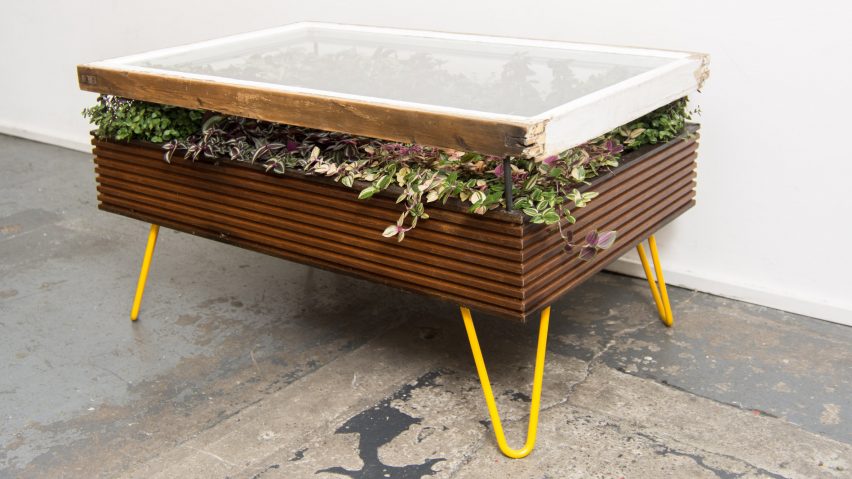London-based company Hackney Botanical has created a collection of seven coffee tables that double up as "indoor gardens" and use found, antique sash-windows as table tops.
The base for these dual-purpose terrariums is made by hand from reclaimed wood, and is perched on midcentury hairpin legs.
Meanwhile either the entire window-frame or just its glass pane are repurposed as tabletops, which can be taken off for watering and are propped up by metal poles to make room for air circulation.
"The windows are Victorian, and were constructed at a time when durability and longevity was inherent in design," explained Hackney Botanical's founder Rose Worrell.
"They have stood the test of time, and although they are no longer needed for their original purpose, their quality stood out to us as integral to the tables."
Each one plays host to a different miniature ecosystem of plants and other elements such as driftwood and coral, taken from nature.
"The more you can manipulate a dead indoor space into recreating the natural world, the happier you will be inhabiting it," Worrell told Dezeen.
"This idea led to us to literally planting into furniture, while retaining the practicality of the everyday coffee table."
According to Worrell, the tables are "practically kill-proof" because both plants and soil are carefully chosen to require minimum maintenance.
"We've made sure that the soil is composed to allow for drainage, which means using a mixture of clay rocks, sand, bark, compost, vermiculite and activated charcoal," she explained.
To ensure the happy co-existing of all the different plants within one table, they are carefully paired as they would be in nature. This in turn means different tables lends themselves to specific indoor environments.
"Some tables are planted with a range of succulent plants which are native to warmer climates and known for their fleshy leaves which retain water. That means they don’t need to be watered as often but do require full sun," said Worrell.
"Other tables feature fern varieties which, to replicate their natural habitat within forest undergrowth, require higher watering levels but can tolerate shady conditions."
Beyond that, the plants are also chosen for their natural air-purifying abilities.
"All plants release oxygen as a by-product of photosynthesis and certain varieties can filter out volatile organic compounds which come from things like cleaning products and paints," she explained.
"Studies have shown that indoor plants improve our overall health and happiness – I think that’s doubly true if you're nurturing them and watching them grow, so that's half of the fun of having one of these tables."
Hackney Botanical, which was founded by Worrell in 2018, provides "plantscaping" – meaning indoor landscaping – services to homes and businesses, catering to the growing market of young people in the UK who predominantly do not own their own homes and outdoor spaces.
As awareness around the positive impact of plants on the health of humans and their cities has grown in recent years, so has their use in everything from architecture and design to urban planning.
Other notable projects in this space include a collection of plant-based furniture by designer Florian Wegenast, a living installation in Jil Sander's Milan headquarters and a Warsaw school with a herb garden roof.

